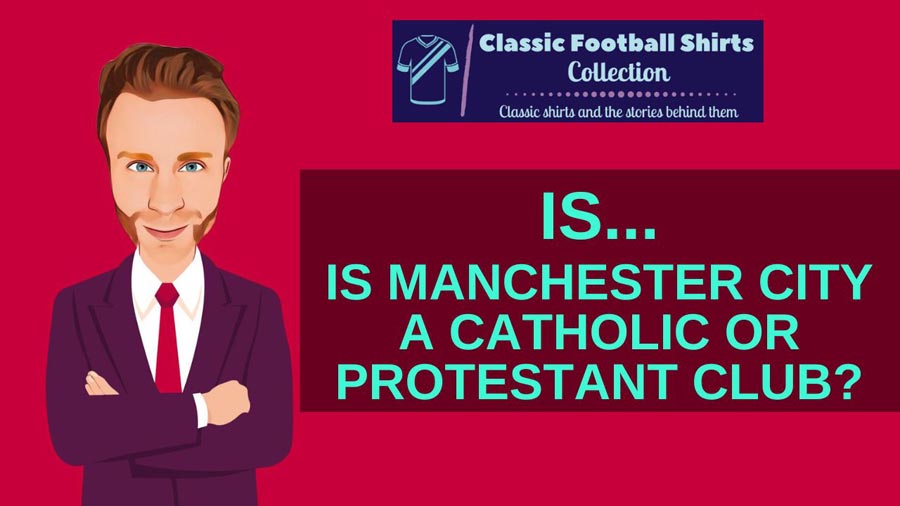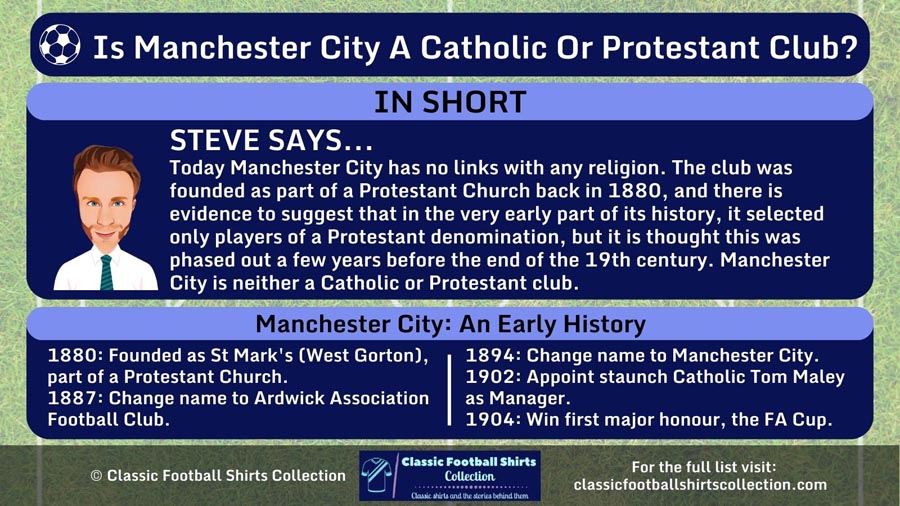
In some countries religion can have a big influence on which football team you follow. In others, it is not important.
I think England definitely falls into the second category.
Nevertheless 100 to 150 years ago, when many teams in England were formed, religion was a much more important part of everyday life than it is today.
So at that time, certain teams were affiliated with certain religious denominations.
But is Manchester City one of them? Is Manchester City a Catholic of Protestant club?
Let’s find out…
Is Manchester City A Catholic Or Protestant Club?
Today Manchester City has no links with any religion. The club was founded as part of a Protestant Church back in 1880, and there is evidence to suggest that in the very early part of its history, it selected only players of a Protestant denomination, but it is thought this was phased out a few years before the end of the 19th century. Manchester City is neither a Catholic or Protestant club.
St Mark’s (West Gorton)
Manchester City was founded in 1880 as St Mark’s (West Gorton), before changing its name to Ardwick Association Football Club in 1887 and then eventually becoming Manchester City in 1894.
What is important to note is that St Mark’s was a church.
At this time many churches had cricket teams, and they proved to be a great way of keeping parishioners together over the summer.
Football teams began to be set up to do exactly the same job in the winter months.
So Manchester City, or St Mark’s as they were known then, was originally formed as a church team.
And St Mark’s was a Protestant church.
Research suggests that for a short period, at the start of its history, St Mark’s purely selected players from Protestant denominations.
But by 1894, when it changed its name to Manchester City, the club had become fully inclusive to all.
This was reflected in the addition of ‘City’ to show that the club was representative of all people in the city.
RELATED ===> Revealed: The Best Retro Manchester City Shirts
An Early Catholic Influence
So very quickly these links to the church that founded the club disappeared and, in fact, many of Manchester City’s early successes were achieved with people of all religious denominations, both on the pitch and in the boardroom.
In fact in 1902 City appointed Tom Maley as manager.
Tom Maley was a staunch Catholic who spent all of his playing career as an amateur in Scotland. Alongside playing football he also had been a journalist for The Glasgow Observer, the city’s leading Catholic newspaper.
Maley led the club to the Division Two championship in 1903, and then to its first major honour, the FA Cup, when they beat Bolton Wanderers in the 1904 Final.
United = Catholic, City = Protestant?
If you do a bit of research into the question of whether Manchester City is Catholic or Protestant, and dig around some Manchester City forums, you will find a number of tales of young supporters in the 1950s and 1960s being told they were Manchester City supporters “because we are Protestants”.
In all honesty, this isn’t because Manchester City is, or was, aligned with a particular religion but because its rivals Manchester United had developed a reputation as a Catholic club.
Douglas Beattie acknowledged this in his book The Rivals Game, Inside the British Derby:
This simple division into Red and Blue is not the only one which has defined the Manchester rivalry. Deep in the background there is the hint of a religious aspect. I’d put it no stronger than that. There have long been perceptions that United have tended to attract more Roman Catholics, without being a Roman Catholic club as such …
However, more than one City supporter told me that they could remember asking aging relatives why the family supported the club and being told it was because they were Protestants. I suspect more than anything else this was a reaction to United’s Irish support, which by default made City the team of the Protestant working-classes.
The Rivals Game, Inside the British Derby, Page 88.
A Club For All Religions
But today Manchester City is definitely neither Catholic or Protestant.
In fact the Manchester City Academy has a partnership with St Bede’s College, a Catholic College.
People of all all races and religions support Manchester City, and as a poster pointed out on a forum when I was researching this question, Manchester City is not a Protestant club, Manchester City is not a Catholic club, it is a football club.
Over the course of its history Manchester City has been represented by Catholics, Protestants, Muslims, Jewish people, Agnostics and many many more groups.
Religion is irrelevant to probably 99% of all Manchester City supporters in respect of supporting the club.
Final Thoughts

Manchester City is neither a Catholic or Protestant club, it has no affiliations with any particular religion.
In the very early years of its history, Manchester City may have had an element of sectarian bias towards Protestants.
This was because the club was set up by a Protestant church.
For a brief period of time, it may have selected players only from Protestant denominations, but it it is thought that this had well and truly stopped by 1894 when it changed its name to Manchester City, and became a club fully inclusive to everyone.
That was over 125 years ago, so any religious links to Manchester City are long gone, and the club is simply defined by its title.
Manchester City Football Club.
